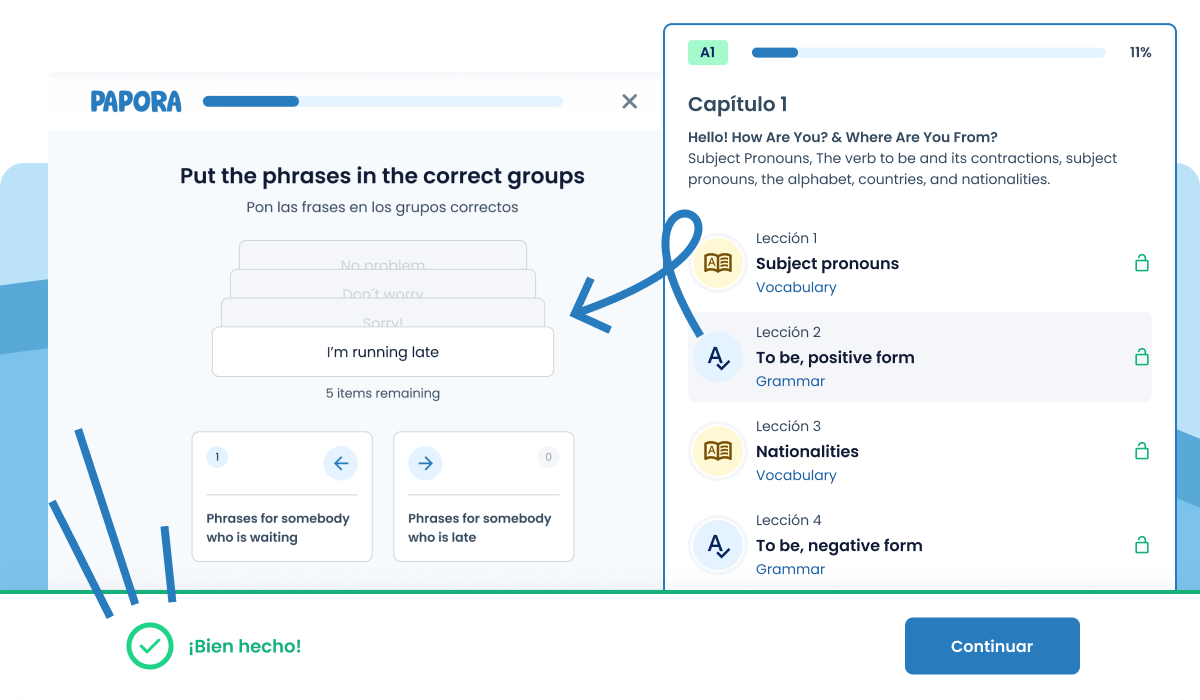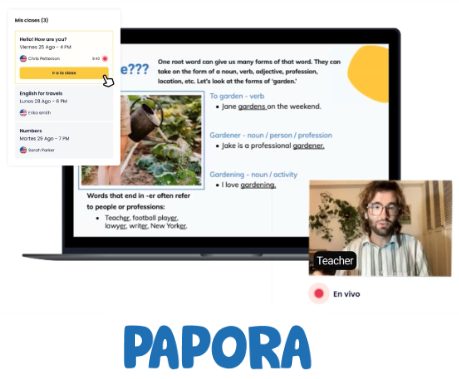If you're in a hurry, look no further, here's what you need:
- Use digital resources and tools
- Watch TV shows, movies, and music in English
- Use vocabulary cards
- Read in English and look up anything you don't understand
- Make it fun
- Talk to native speakers
- Sign up for interactive classes
Deciding to learn English can feel challenging — especially if you don’t have the time to attend in-person classes.
In these situations, learning English on your own is often the best option. While it might seem overwhelming at first and knowing where to begin can be tricky, following the right approach makes a big difference.
Start by applying effective tips, exploring quality resources in your own language, and choosing a method that suits your learning style.
And if you want a clear, structured way to learn English step by step from home, a course like Papora is an excellent choice. It offers a fun, flexible way to learn while giving you all the tools you need to succeed.
Learn English while having fun with Papora
Learn English like a game with interactive activities, completely at your own pace.
Start learning now

Effective Ways to Learn English on Your Own
Fortunately, there are now countless ways to learn English independently.
However, it’s important to remember that in order to truly understand and master the language, your approach should cover all key areas — grammar, pronunciation, listening, and reading.
That’s why, instead of just giving you a step-by-step guide, we’ve created this article with a list of practical tips you can easily adapt to your own learning method.
Use digital resources and tools
One of the biggest advantages that technology and the internet offer is the ability to learn from home, using countless tools available with just a click.
When it comes to learning English, there’s a wide variety of resources to choose from, YouTube videos, online exercises, digital books and PDFs, and platforms like Papora, where you’ll find helpful English tips and guidance at home to keep your practice consistent.
However, it’s important to remember that not all materials will work for everyone. Learning English isn’t a magical process — it’s more like a roller coaster. The key is to filter the resources you use and focus on those that match your personal learning style.
Learn with English TV shows, movies, and music
This is undoubtedly one of the most recommended methods, because it allows you to learn with common vocabulary that any native speaker can handle.
Plus, watching TV shows or movies to learn English is something you can do in your free time and learn while spending time with family or friends.

In the case of music, you can listen to it on public transportation when you leave work or school.
When selecting the best series to practice English for your level, start with subtitles if you're a beginner, and gradually improve your English level as you understand more words. The same goes for learning with music: start by reading the lyrics and practice.
This is also a perfect way to use the shadowing technique.
“I recommend a fantastic way to improve fluency and pronunciation: shadowing. Basically, you have to find a video or audio file with the transcription or lyrics of the song and try to copy the person speaking, so you're saying what they're saying at the same time as them. This helps you pick up on accents and is a great way to start sounding more fluent.”
Use Vocabulary Cards
Vocabulary cards are one of the best activities you'll find for learning new words during this process, especially if you want to study verbs.
This technique involves writing the new words you want to learn on cards, then studying them randomly and saying what they mean. If you already know one, move on to the next.
It's like learning the language like a game. As you master a word, you increase your level of learning and, of course, your level of English.

If you haven't been able to do this, you can write a tip on the back of the card to remember it next time.
You can also use this technique with phrases or a specific topic in the language you want to remember.
You don't have to do this on paper cards; you can always opt for apps that do the same job. Most of them can be found in your phone's app store.
Read in English and look up what you don't understand
If you like reading good stories, this tip is for you. Reading is one of the best ways to learn English on your own.
Of course, when you're at a basic level of English, in addition to a book, a dictionary or translator will be your best friend.
This way, every time you read the book in English, you'll also look up the words you don't understand, which will be new vocabulary for you.

A good trick is also to write down the words in a notebook in case you can't look them up at the moment, so you can resume learning more calmly at home and review a bit.
English learning with artificial intelligence can enhance this process by providing instant translations, allowing you to quickly understand new words and continue learning smoothly.
Now, if books aren't your thing to learn English, you can always choose to read other things.
It could be the news before starting work, magazine articles, or anything else you can find in English that catches your attention. The important thing is to know how to learn to read English so you can learn vocabulary and grammar.
Make it fun
We can't force ourselves to learn something we don't enjoy; it happens with everything, and English is no exception.
It's not about always staying motivated to achieve our goals; it's about maintaining the determination to reach them. That's why making activities fun will be the best way to learn for yourself.
“Make it fun! No matter how you do it, make it fun. You have two options: you can work with a very boring textbook, and while you'll definitely make progress, the chances of you stopping and becoming demotivated will be very high. However, if you develop a specific routine, a pace that works for you, and a set of resources that work for you, you'll stay motivated!”
Avoid long, repetitive study sessions where you read the same material over and over — you’ll only end up exhausted and frustrated, just like cramming for a school exam.
Instead, design a routine that includes activities you genuinely enjoy and allow your learning process to unfold naturally.
Talk to native speakers
If you have the opportunity to have conversations with native speakers, do it. This is one of the best ways to learn English.
In fact, finding a native teacher is a great strategy, or using and purchasing app services like HiNative are perfect for supplementing your learning.

However, the most effective way to learn is by participating in a language exchange program in an English-speaking country. Immersing yourself completely in the language can help you start speaking and understanding English in as little as three months — or at least develop essential communication skills.
Being on an exchange is similar to how we learn our first language as children: you start by speaking it naturally before you learn to write it.
There’s truly nothing more valuable than interacting with native speakers. They’ll show you how the language is spoken in real conversations, help you improve your fluency, and teach you words and expressions you won’t find in textbooks or dictionaries.
Enroll in interactive classes
A great alternative to in-person academies are interactive online courses, where you can learn the same things, and even much more, just by logging in with your email address.
While it's possible to learn languages on your own, you'll never be as prepared as if you learn them with the help of experts, where you'll learn all areas of the language.
“Our brains learn best when we don't feel like we're learning. Make sure you focus on the four key skills: reading, writing, listening, and speaking, but how you do it is up to you. If you think you could use more structure, find a good textbook or online course you trust and can follow day after day.”
If you don't have enough time, online courses like Papora are the best option for you, allowing you to learn completely at your own pace and complementing the other points we've mentioned throughout the list.
Plus, with Papora, you can earn a certificate proving your English proficiency, which is a wonderful advantage to add to your CV or when applying for a job.

The most important thing when you're learning English is to feel comfortable and find the method that works best for you.
Frequently asked questions about learning English on your own
There's no specific order to learning a language, but if you're starting from scratch, it's recommended to begin with topics that are practical and useful, such as greeting, introducing yourself, and explaining what you do. If you need a guide to learning English, you can always start by enrolling in courses like Papora.
The best technique is immersion, where everything you consume, think, and, if possible, even speak in English. This will allow you to get used to the language, learn to understand the context, and learn new vocabulary.






